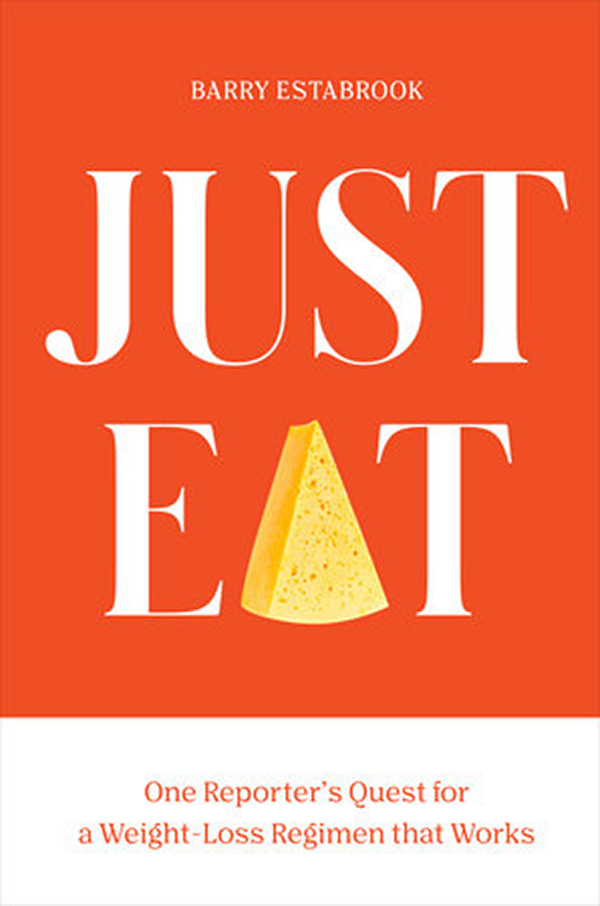Published in February, ‘Just Eat’ is authored by award-winning food writer and journalist Barry Estabrook.
Courtesy of Penguin Random House
By Annalise Anderson
Just as it’s known for oversized helpings of French fries, buttery crusted apple pies and barbecued pork that can only be truly enjoyed with a heaping side of potato salad, America is also known for its obsession with diet culture.
Journalist turned awarded food author Barry Estabrook explores the pitfalls, confounding wellness guidance and money-hungry “medical professionals” behind the nation’s most popular diet crazes in his latest book, Just Eat.
But rather than rip each meticulously crafted diet trend to shreds, like all good journalists, Estabrook lets the scientific data, affluent dieting trendsetters and his doctor’s orders do the talking.
In between paragraphs packed with statistics, dieting history and insights from esteemed professionals, like New York Times bestselling author Dr. David Ludwig of Harvard Medical School and The South Beach Diet founder Dr. Arthur Agatston, Estabrook details his personal trials and tribulations with his weight, cholesterol and blood pressure, and his experience in testing out some of the world’s most popular diet fads.
Estabrook essentially serves as the curious reader’s dieting Guinea pig, putting himself through nearly four years of promised results, yo-yoing numbers on the scale and disappointing returns to the doctor’s office.
It’s established early in the book that nearly all diets are broken into three categories: low-carb, low-fat and calorie restrictive. Unsurprisingly, most of them are less than pleasant experiences for a foodie like Estabrook who enjoys hearty burgers, evening martinis with his wife and “unfettered Yuletide indulgence.”
A journalist at heart, Estabrook candidly explains his attempts to follow diets, like The Whole30, Ornish’s diet, South Beach, Atkins, Weight Watchers, paleo and vegan, in order to adhere to his doctor’s orders and lose 40 pounds. He even consulted fine French and Mediterranean chefs on healthy eating, only to conclude that there’s simply no “right” way to approach dieting.
Before delving further down the American diet rabbit hole, Estabrook reveals his rocky start with the Master Cleanse and Whole30, ultimately setting the tone for the rest of Just Eat. “The Master Cleanse and Whole30 provided me with one lasting benefit: I was equipped with firsthand knowledge and a healthy mistrust of the culture of going on diets, particularly fad diets,” Estabrook wrote.
Estabrook doesn’t hesitate to write frankly about his modern family life nor his own upbringing. The history of other common vices like processed sugars and alcoholic beverages are shared through Estabrook’s childhood experiences at his family’s vacation home in Jamaica and their persistent consumption of alcohol, which, during the 1950s, was not seen for what Estabrook says it truly was: alcoholism.
While coming to terms with his food preferences and the autonomy to make more health-conscious choices, Estabrook echoes the relatable sentiment that dieting is hard and it’s too easy to fall victim to grandiose marketing schemes that inevitably lead people who are desperate for a lifestyle change into an unsustainable way of living.
After nearly four years of experimenting, Estabrook declared, “As a dieter, I flunked.”
However, his waist shrank, blood pressure lowered and keeping up with his children became easier after closely examining the food he consumed, tossing out the glossy-paged dieting books, dismissing the god-like physiques of dieting influencers and relying on his intuition.
“Diets are based on the premise that their authors have found a new, better way to eat and they try to convince you to consume food in a way that fits with their strictures,” Estabrook wrote. “To succeed, you must force yourself to adhere to their rules. That’s attacking the weight problem from the precisely wrong direction. You should lead a diet, not follow one.”
Compared to the overwhelming information a Google search will yield, Just Eat’s 13 chapters compiles and expounds on dieting fads in a clear, easy-to-read – and frequently comical – way, thanks to Estabrook’s exceptional ability to weave in personal anecdotes and laugh-out-loud quips. With each turning page, readers further understand the scams behind dieting culture, empowering them to lead their own diets.



